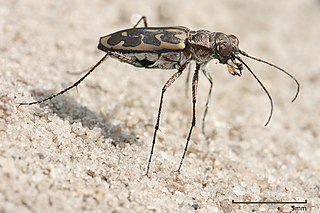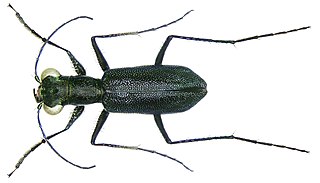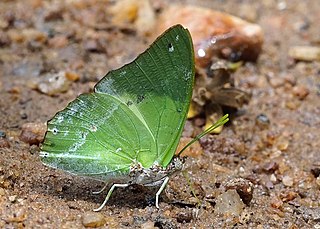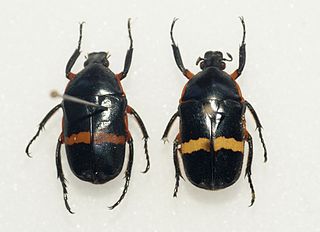
Tiger beetles are a family of beetles, Cicindelidae, known for their aggressive predatory habits and running speed. The fastest known species of tiger beetle, Rivacindela hudsoni, can run at a speed of 9 km/h, or about 125 body lengths per second. As of 2005, about 2,600 species and subspecies were known, with the richest diversity in the Oriental (Indo-Malayan) region, followed by the Neotropics. While historically treated as a subfamily of ground beetles (Carabidae) under the name Cicindelinae, several studies since 2020 indicated that they should be treated as a family, the Cicindelidae, which are a sister group to Carabidae within the Adephaga.

The lesser red musk shrew is a species of mammal in the family Soricidae. It is found in Angola, Botswana, Democratic Republic of the Congo, Malawi, Mozambique, Namibia, South Africa, Eswatini, Tanzania, Zambia, and Zimbabwe. Its natural habitat are savanna, subtropical or tropical dry lowland grassland, and hot deserts.

The moonshine shrew is a species of mammal in the family Soricidae. It is found in Angola, Burundi, Democratic Republic of the Congo, Kenya, Malawi, Mozambique, Rwanda, Tanzania, Uganda, Zambia, and Zimbabwe. Its natural habitat is subtropical or tropical moist montane forests.

The greater dwarf shrew is a species of mammal in the family Soricidae. It is found in Angola, Botswana, Democratic Republic of the Congo, Kenya, Malawi, Namibia, Tanzania, Zambia, and Zimbabwe. Its natural habitats are subtropical or tropical dry forests and dry savanna. It is present in several protected areas, including the Kruger National Park. The main threat to greater dwarf shrews is the loss or degradation of moist, productive areas such as wetlands and rank grasslands within suitable habitat.

The lesser dwarf shrew is a species of mammal in the family Soricidae. It is found in Botswana, Democratic Republic of the Congo, Lesotho, Malawi, Mozambique, South Africa, Tanzania, Zambia, and Zimbabwe.

The climbing shrew is a species of mammal in the family Soricidae, which is found in subtropical Africa. It is found in Angola, Benin, Burundi, Cameroon, Central African Republic, Republic of the Congo, Democratic Republic of the Congo, Ivory Coast, Ethiopia, Ghana, Guinea, Kenya, Liberia, Malawi, Mozambique, Nigeria, Rwanda, Sierra Leone, South Sudan, Tanzania, Togo, Uganda, Zambia, and Zimbabwe. Its natural habitats are subtropical or tropical moist lowland and montane forests, and moist savanna.

Lophyra is a genus of tiger beetles in the family Cicindelidae capable of flight. They are found in Africa, Asia, and Europe
Bennigsenium is a genus in the beetle family Cicindelidae. There are about 11 described species in Bennigsenium, found in Africa.

Brasiella is a genus of tiger beetles in the family Cicindelidae. There are more than 50 described species in Brasiella.
Caledonomorpha is a genus of beetles in the family Cicindelidae, containing the following species:

Leptognatha is a genus in the beetle family Cicindelidae. There are more than 30 described species in Leptognatha.

Myriochila is a genus of tiger beetles in the family Cicindelidae, containing the following species:

Oxycheila is a genus in the beetle family Cicindelidae. There are more than 50 described species in Oxycheila.

Prothyma is a genus in the beetle family Cicindelidae. There are more than 40 described species in Prothyma.

Protocollyris is a genus of tiger beetles in the family Cicindelidae, tribe Collyridini.
Callistomimus is a genus in the beetle family Carabidae. There are more than 80 described species in Callistomimus.

Charaxes acuminatus, the pointed pearl charaxes or mountain pearl charaxes, is a butterfly in the family Nymphalidae. It is found in Uganda, Rwanda, Burundi, Kenya, Tanzania, the Democratic Republic of the Congo, Malawi, Zambia and Zimbabwe.

Charaxes eupale, the common green charaxes, is a butterfly in the family Nymphalidae. It is found in Senegal, Guinea, Sierra Leone, Liberia, Ivory Coast, Ghana, Togo, Nigeria, Cameroon, Gabon, the Republic of the Congo, the Central African Republic, Angola, Zambia, the Democratic Republic of the Congo, Uganda, Sudan, Rwanda, Kenya, Tanzania and Malawi.

Charaxes dilutus is a butterfly in the family Nymphalidae. It is found in Uganda, Tanzania, Malawi, the Democratic Republic of the Congo, Zambia and Angola. The habitat consists of tropical evergreen forests.

Chondrorrhina is a genus of fruit and flower chafers belonging to the family Scarabaeidae, subfamily Cetoniinae, found in Africa.















